Research Article
LEADERSHIP IN DESIGN AND MANAGEMENT OF SERVICES AND SMART TRANSFORMATION IN HOSPITALITY TEACHING AND TRAINING: THE CASE STUDY OF THE FACULTY OF TOURISM AND HOTELS - FAYOUM UNIVERSITY - EGYPT
910
Views & Citations10
Likes & Shares
This chapter includes the capabilities of excellence for the Faculty of Tourism and Hotels - Fayoum University (the first accredited faculty in higher tourism education in Egypt since August 2016) in the teaching process and training and consulting services individually or jointly, through human experts with international and local experiences in hospitality education and training, design, provision and development of valuable services innovatively added in the hospitality industry that is not accustomed to other Egyptian tourism faculties. This includes services presented at the educational hotel and resort. Also the use of information technology and its innovative mechanisms such as room management systems, stores management, points of sale and the electronic education system that support the transition to providing electronic services in the educational process, scientific research and training services according to local, regional and international benchmarks of performance, in order to satisfy students of hospitality studies specialization.
Keywords: Seven-Star Services, Smart Transformation, Capabilities of excellence, Hospitality Education
INTRODUCTION
This chapter is a comprehensive case study of the Faculty of Tourism and Hotels, Fayoum University. All academic and non-academic programs are under analysis with more concentration on the excellence in the hospitality teaching and training (Figure 1).
Faculty Establishment (Faculty of Tourism & Hotels, Fayoum University, 2007; Wafik, Fawzy, & Hassanein, 2011; Faculty of Tourism and Hotels, Fayoum University, 2010).
On September 23rd of 1993, a republican decree was issued to establish the Faculty of Tourism and Hotels in Fayoum as a branch of Cairo University. This came in accordance with a proposal made by Cairo university council headed by Professor Mamoun Salama, the former president of Cairo University and Mohammad Said Solayman, the former vice-president of Fayoum Branch as a member. Studies began with the beginning of the academic year 94/95 in one of the buildings of the Faculty of Engineering, which is presently the Institute for Research and Strategic Studies of Nile Basin Countries.
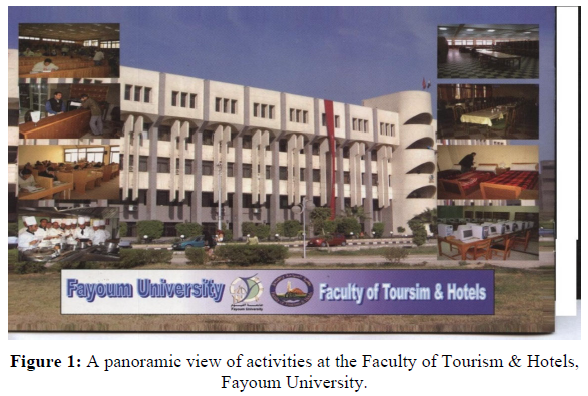

In 1994 a resolution was passed by Professor Mufid Shehab, the former president of Cairo University, to appoint Professor Mahmoud Heweidi as the first dean of the faculty. In the same year, the first class which amounted to 276 (47 females, 229 males) joined the faculty.
In 1998 Dr. Farouk Ismael, the former president of Cairo University, attested the results of the B.Sc. of examinations of the first class of graduates.
In 2001 Professor Mufid Shehab, the former minister of Higher Education and Scientific Research and Professor Naguib Al-Hilaly Gouhar, the former president of Cairo University, inaugurated the training hotel which is attached to the faculty and is considered as one of the best fully-equipped training hotels in Egyptian universities.
On March 27, 2002 Professor Nashaat Essayed Mortada was appointed vice-dean of education and students’ affairs. He has actively participated in founding and furnishing the new faculty building which is the most unique one of all Tourism and Hotels faculties’ buildings in Egyptian Universities.
In 1999, postgraduate studies began for the assisting teaching staff in the faculty and at the beginning of the academic year 2005/2006, registration for postgraduate studies in fields of specialization began for graduates holding B.Sc. in Tourism and Hotels. In the same academic year (2005/2006), studies for the two-year diploma program in one of the three fields of specialization (tourism, hotels, tourism guidance) began for graduates of different faculties and equivalent higher institutes.
The building of the Faculty of Tourism and Hotels is within the university campus. Construction costs consist of more than 14 million pounds. The building consists of 6 storeys and a fashionable modern training hotel attached to it.
Faculty logo includes ancient Egyptian monuments discovered in Fayoum as well as governorate’s tourist attractions (Qaroon Lake- Fayoum Waterwheel- Sinosert Obelisk- Lahoon Pyramid).
The faculty's announced objectives as follows:
The mission of the faculty is to produce efficient and qualified graduates. The aims of the faculty are as mentioned below (Faculty of Tourism & Hotels, Fayoum University, 2007; Wafik, Fawzy, & Hassanein, 2011; Faculty of Tourism and Hotels, Fayoum University, 2010).
Helping students to gain required knowledge and skills through distinguished courses and programs.
- Supporting students academically to grant a high quality education and to provide the tourism sector and other productive sectors with efficient and qualified graduates.
- Raising the society's conviction of the outputs of the faculty.
- Encouraging academic research and different academic activities.
- Having an effective role in local community.
- Providing proper human resources
- The faculty's main academics units are: the Unit of Quality Assurance and Accreditation; the Unit of Assessment Systems promotion; the Unit of Management Information Systems; the Unit of Graduates Follow-Up; and the Unit of e-Services; The Unit of Quality Assurance and Accreditation (Faculty of Tourism & Hotels, Fayoum University, 2010). The unit works on upgrading the quality of tourism education and its continuous development in accordance with the national standards for structuring, and systems, resources and ethics of the educational process, scientific research and community-based environmental services.
Moreover, the unit seeks to gain the community's confidence in the faculty's graduates to achieve competitive advantage locally and regionally. As from August 2016, Faculty of Tourism and Hotels at Fayoum University has been accredited by the National Authority for Quality Assurance and Accreditation of Education (NAQAAE), and has become the first endorsed faculty of tourism education in Egypt (Figure 2).
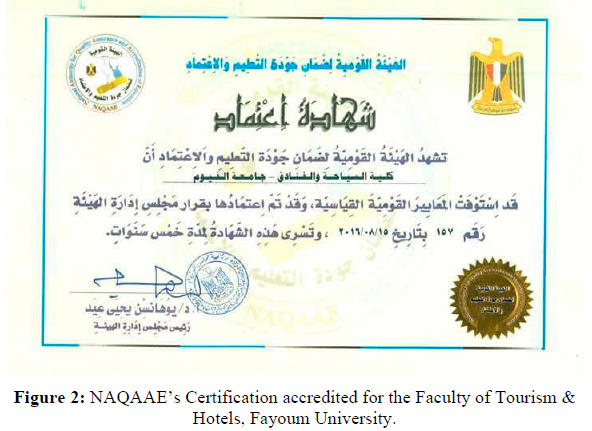

The Center for Public Service, previously named Center for Community Service, Training, and Free Studies. The community service and developing the local environment on the academic, cultural and tourist side are among the major purposes of establishing the faculty. These aims are achieved through the Public Service Center which provides the following services (Faculty of Tourism & Hotels, Fayoum University, 2007; Wafik, Fawzy, & Hassanein, 2011; Faculty of Tourism and Hotels, Fayoum University, 2010). Organizing conferences and conventions inside and outside the Fayoum University.
- Organizing specialized training courses; such as Amadeus reservation system.
- Running foreign language courses: English - French - German - Italian - Spanish - Russian - Japanese -
- Computer Courses.
- Specialized courses in hotel management conferences and banquets.
- Running different courses in tourism and hospitality industries in collaboration with distinguish tourist companies and hotels.
- Organizing ecotourism programs for foreigners and Egyptians in Fayoum.
- Organizing honorary parties and graduation parties.
- Preparing feasibility studies for tourist and hotel projects.
- Cooperation’s with the Fayoum Governorate, non-governmental societies and agencies and directorates of youth and sport to organize and run seminars related to their work and activities.
- Internet, telephone and fax services.
- The center's main units and departments are: the Teaching Hotel and Ancillary Units; the Unit for Training and Human Resources Development; the Unit for Conferences and Events; the Unit for Selling Products and Services Outlets; and Unit of Tourism Services.
The Project of Eco-Tourism (Faculty of Tourism and Hotels, 2006)
The governorate of Fayoum enjoys outstanding tourist landmarks and attractions including coastal, agricultural, and desert ones. However, this variety of attractions is not properly promoted.
The initiative idea of the project was proposed by our faculty and was funded with the offer presented by the American Aid Organization and that of the Egyptian Ministry of Information and Communication. 80 excursions were made to the famous places in Fayoum with a report of each of the excursions both in Arabic and in English.
More than 4000 photos of the visited places were taken of which 500 were selected to be displayed on the project web site.
Examples of the project outputs are: A web site was created exhibiting the environmental tourist attractions and the other tourist facilities in Fayoum; and the required equipment such as server, firewall, routers, laptops, switches, and a network of 24 points have been installed.
The Special Education Programme "Tourist Guide and Archeology" is also been added. Its aims are (Faculty of Tourism and Hotels, 2006):
- Rehabilitation specialists in the field of tourist guide to keep the relics in the light of environmental protection.
- Training personnel for the exercise of tourist guide professionally to verify the continued development in the fields of tourism and monuments and other types of tourism based mainly on environmental and natural resources, industrial and archaeological sites.
- Set up a cadre of graduates with a bachelor's degree specializing in the field of "tourist guide and archeology" in accordance with the rules and regulations of sustainability. In addition to the preparation of training programs that emphasize the continuing revitalization of these graduates, which confirms their ability to facing the challenges and variables of the profession.
The Main Case / Excellence in Hospitality Teaching and Training through the Last Four Academic Years: 2016-2017; 2017-2018; 2018-2019; 2019-2020
(Department of Education and Student Affairs, Faculty of Tourism and Hotls, Fayoum University, 2016-2017; Department of Education and Student Affairs, Faculty of Tourism and Hotls, Fayoum University, 2017-2018; Department of Education and Students Affairs, Faculty of Tourism and Hotels, Fayoum University, 2018-2019; Department of Education and Student Affairs, Faculty of Tourism and Hotels, Fayoum University, 2019-2020; Public Service Center, Faculty of Tourism and Hotels, Fayoum University, 2016-2017; Public Service Center, Faculty of Tourism and Hotels, Fayoum University, 2017-2018; Public Service Center, Faculty of Tourism and Hotels, Fayoum University, 2018-2019; Public Service Center, Faculty of Tourism and Hotels, Fayoum University, 2019-2020).
The distinctive modern academic programe in hospitality: the Program for Management and Operation of Tourist Restaurants in the reciprocal education system between the the Hotel Studies Department, Faculty of Tourism and Hotels - Fayoum University and the Egyptian Company for International Tourism Projects - Americana Egypt with the credit hour system 2020 (Figure 3).
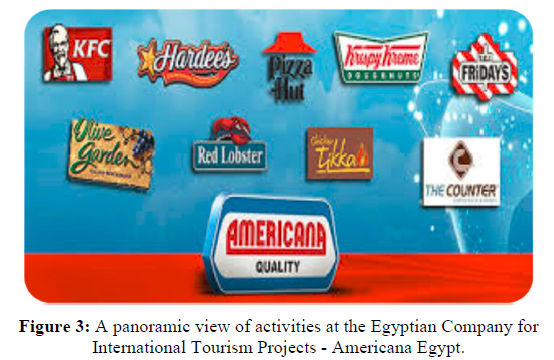

Program Goals
- Raise the learner’s level of awareness of contemporary academic and professional issues in his field of
- Development of the student's abilities of self-learning, decision-making, critical thinking, and crisis handling.
- To raise the graduate's competence professionally in order to raise his competitiveness in the labor market.
- Bridging the gap between graduate specifications needed by the market and the current specifications of graduates.
Program Intended Learning Objectives
- Knowledge Skills
The learner must be able to:
- Know the concepts, characteristics and dimensions of the restaurant sector and its components.
- Discuss the foundations and methods of business management of food service establishments.
- Discuss the economic importance and basic concepts in food service establishments.
- Define the principles of human rights and knowledge of the legislation and laws regulating the operation of restaurants.
- Know the basics of food and beverage production and service operations and the basics of food health and safety.
- Define computer applications and programs specialized in restaurant business.
- Know the safety, security and occupational health requirements specified by the competent government agencies.
- Explain the axes and points of the food quality control programs applied in the chain and the ratings thereof.
Mental skills
The learner must be able to:
- Take operational and administrative decisions in accordance with work requirements in food service establishments.
- Compare the customs and cultures of the clients and their varied needs.
- Suggest appropriate solutions to the problems specialized in the restaurant sector.
- Compare the administrative and operational patterns in the work environment related to food service establishments.
- Distinguish between future plans and short-term goals for restaurants.
- Distinguish the tension and weights units for all products, packages and wrapping papers in the restaurant.
- Discuss emergency, evacuation and crisis management plans and practices for the restaurant.
- Compare storage of dry, fresh, frozen and chemical materials for packaging.
- Professional and practical skills
The learner must be able to:
- Write professional reports for various jobs in the restaurant sector.
- Apply professional rules, behaviors, ethics and ethics in the field of work in food service establishments
- Use information technology applications in managing and operating businesses in restaurants.
- Practice work in various administrative and professional positions in restaurants.
- Apply financial and accounting operations in managing the business of food service establishments.
- Apply modern quality systems and fundamentals of public health and food health and safety.
- Use Arabic and foreign terms in the field of professional work in restaurants.
- Carry out weekly and monthly reviews of the profit and loss lists and ensures that the profit budgets of the sub-tasks are adhered to and achieve the profitability agreed upon with the senior management.
- Track all the basic and subsidiary tasks of the restaurant employees.
- Design the training plan, promotions, incentives, and penalties for all employees.
- General skills
The learner must be able to:
- Search for information using modern technological means.
- Acquire the skills of self-education and continuous improvement of the level.
- Organize effective discussions and presents its opinions in a scientific and purposeful manner.
- Express opinion, cooperation and work in a team.
- Adhere to the principles of public relations and respect the opinions of others.
- Be fluent in computer skills and information technology and their applications in business fields.
- Be fluent in dealing in foreign languages and communicating verbally and in writing.
- Acquire the ability to manage time and withstand work pressures
- Solve Problems.
- Be able to present his point of view and persuasive interpretation.
- The purpose of field training is to provide the student with a set of knowledge, skills and values associated with the study program.
- The field training program will is implemented at the actual work sites of the restaurants affiliated to the Egyptian Company for International Tourism Projects - Americana Egypt located in Cairo and North Upper Egypt, and what is approved by the department council with the approval of Americana and the approval of the college council.
- Practical study (practical education on the job in the actual and realistic working conditions and environment, the actual working hours and duration of four semesters are 67 credit hours).
- Supervision of field and practical training shall be made by the faculty members participating in the study program (assisted by members of the supporting staff.
- Field training programs are implemented either inside or outside the college according to the requirements and objectives of the program.
- Committees of faculty members concerned with supervising students and other members, if necessary, are formed to evaluate students according to a pre-announced list of specific standards and to hold an oral, practical and theoretical examination.
- Transport students from Fayoum University Campus to restaurants of training.
- Providing a job position after
- The student’s acquisition of general and behavioral skills.
BUSINESS ADMINISTRATION PROGRAM IN THE HOSPITALITY INDUSTRY
The Seven-Star Services in Hospitality Teaching and Training
(Design and manage services and associated processes)
This criterion includes the capabilities of excellence for the Hotel Studies Department Faculty of Tourism and Hotels-Fayoum University in the teaching process, training services, consultations, community service and the environment individually or jointly within the framework of the axes of Egypt 2030 vision, through human staff with international and local expertise, and the design, provision and development of services with added value in an innovative way in comparison with the similar colleges, such as accommodation, food and beverage services. This leads to achieve the satisfaction and positivity of the beneficiaries and improves the results of the institutional performance of the faculty, based on the system of evaluating the results of performance indicators for the services provided through beneficiary surveys about the services provided. This is clear illustrated in the Table 1.
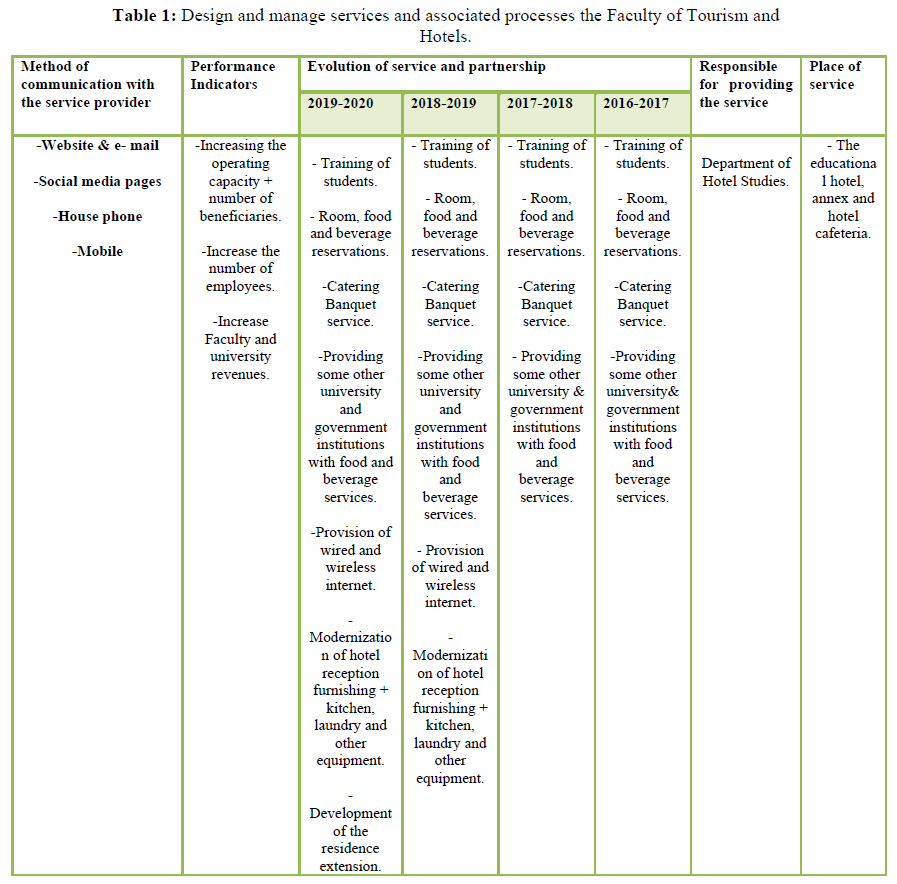
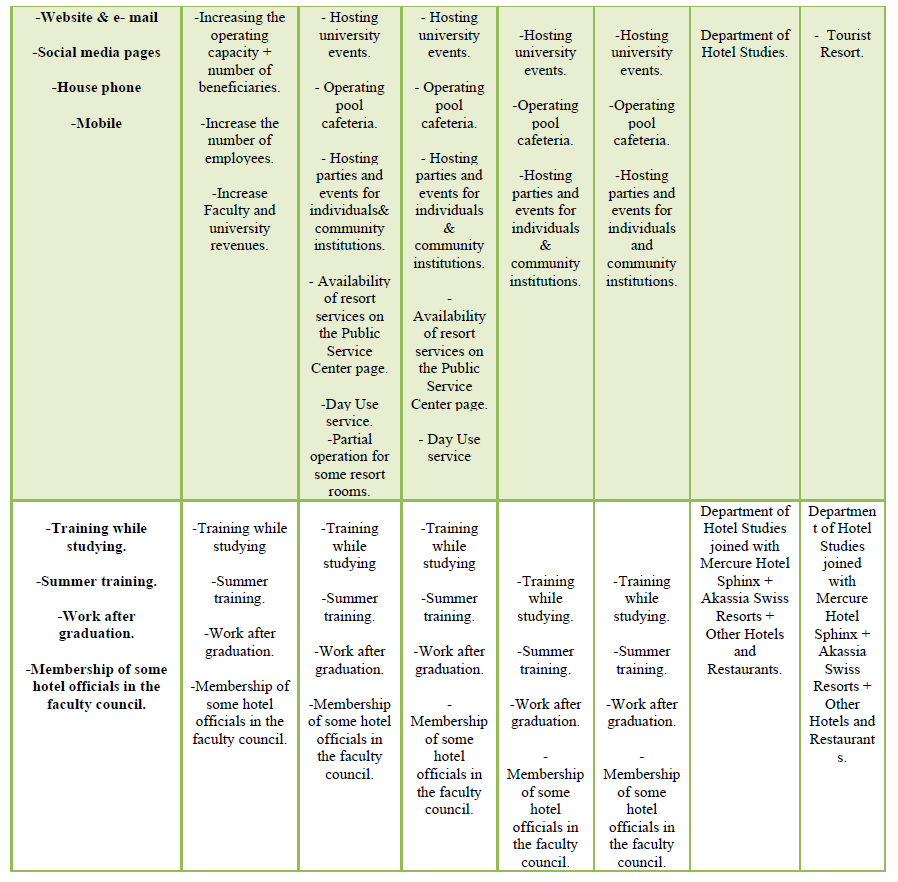


THE ELECTRONIC / SMART GOVERNMENT IN HOSPITALITY TEACHING AND TRAINING
(Designing and implementing smart transformation plans and policies)
This standard includes the excellence capabilities of the Hotel Studies Department of the Faculty of Tourism and Hotels - Fayoum University in the use of information technology and digital solutions for smart government. In order to guarantee an added value in an innovative way according to local and international standard performance indicators, and based on the evaluation of the results of the performance indicators of electronic transformation and smart government, including those related to the advanced electronic infrastructure in the faculty, the flow of information and information security in the faculty, and the presence of the faculty on the Internet and social networks. More details in the Table 2.
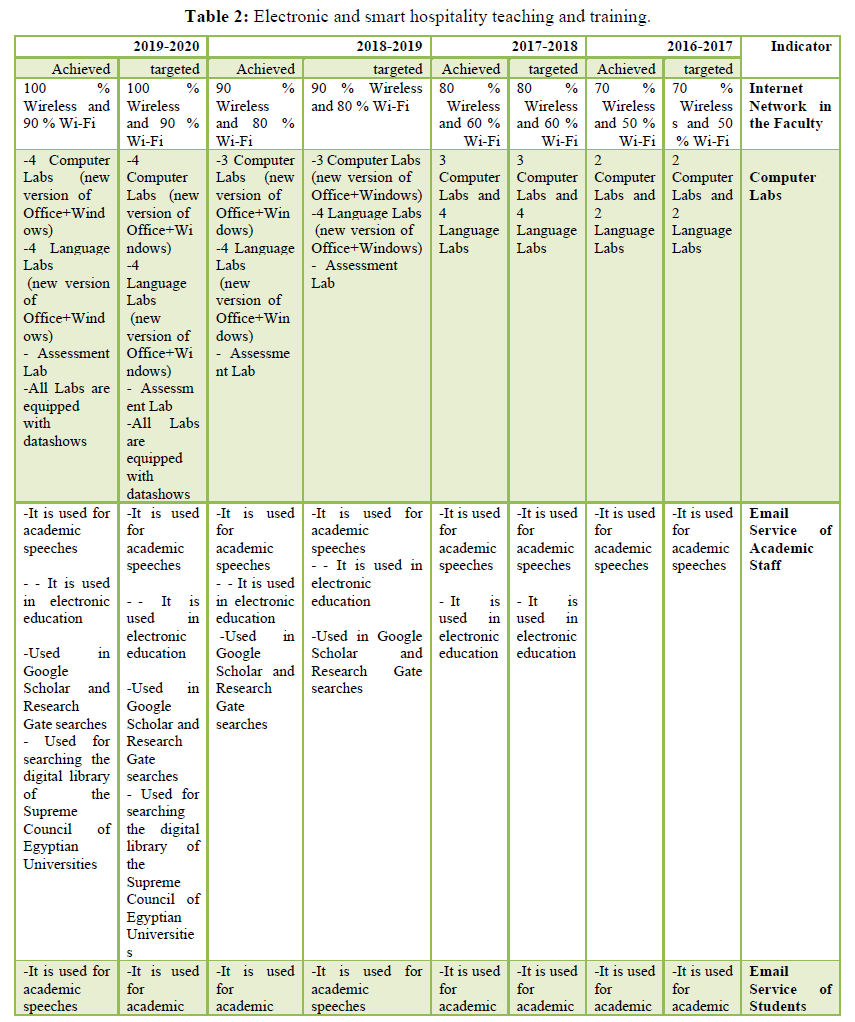
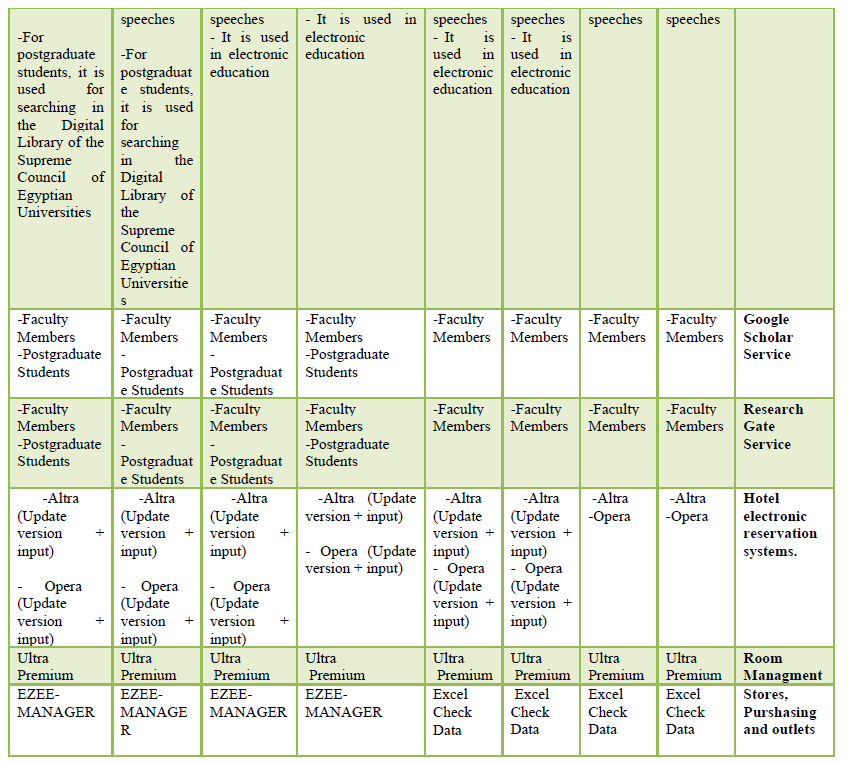


REFLECTIONS & RESULTS
Reflections
This study investigates the role of the Hotel Studies Department at the Faculty of Tourism and Hotels- Fayoum University as a leader example in hospitality education and capacity-building for employability. The manuscript sheds light on the hospitality education and its traceability for building capacity for employability in hospitality industry.
Results
Presenting a package of job and career chances for youths in case of joining in the hospitality education. Available jobs suitable for graduates' living conditions in the Educational Hotel and Resort as showed in the Figure 4.
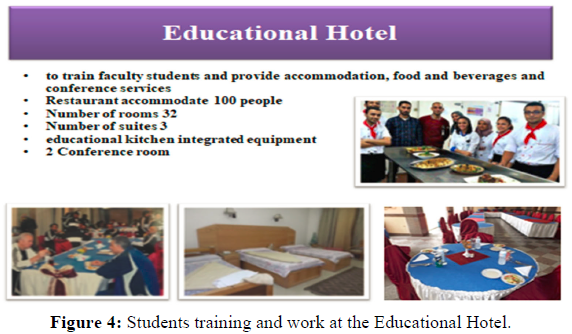

Collaborative activities with employers in Hospitality training and work. There are a number of agreements and joint work between the Hotel Studies Department and the institutions of the hospitality business. For example, the partnership between the Hotel Studies Department and the Hotel Mercure Pyramid in conducting the Little Chef Competition as in Figure 5.
RECOMMENDATIONS
Based on the previous display, the study recommends:
- The Hotel Studies Department to pursue for regional and world accreditation.
- More academic programs in hospitality major such as Culinary Art program.
- To place the educational hotel and resort on global hotel reservation systems.
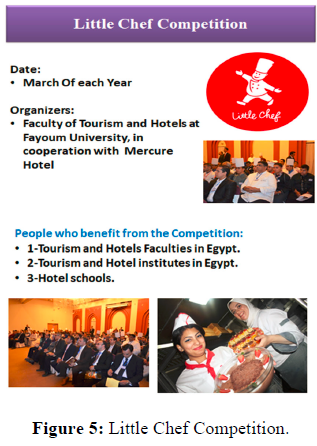
CONCLUSION
The current study has many benefits in different areas:
- Scientific: Where it provides a comprehensive framework of ideas and different methodologies for hospitality education compatible with the labor market in terms of teaching, training and skill building.
- Applied and Community: The study provides a successful experience of the Hotel Studies Department at the Faculty of Tourism and Hotels- Fayoum University in serving the community and build partnerships with businesses and employers in the hospitality industry.
- Department of Education and Student Affairs, Faculty of Tourism and Hotels, Fayoum University. (2016-2017). Annual Report. Fayoum, Egypt.
- Department of Education and Student Affairs, Faculty of Tourism and Hotls, Fayoum University. (2017-2018). Annual Report. Fayoum, Egypt.
- Department of Education and Students Affairs, Faculty of Tourism and Hotels, Fayoum University. (2018-2019). Annual Report. Fayoum, Egypt.
- Department of Education and Student Affairs, Faculty of Tourism and Hotels, Fayoum University. (2019-2020). Annual Report. Fayoum, Egypt.
- Faculty of Tourism & Hotels, Fayoum University. (2007). Booklet of Faculty of Tourism & Hotels. Fayoum: Faculty of Tourism & Hotels, Fayoum University.
- Faculty of Tourism and Hotels. (2006). Available online at: www.ecotourism.edu.eg
- Fayoum University. (2010). Faculty of Tourism and Hotels. Available online at: http://www.fayoum.edu.eg/tour/
- Fayoum Governorate, & Fayoum University . (2010). Tourism Development in Fayoum: the Current Situation and Future Vision: Joint Project. Fayoum, Egypt.
- Public Service Center, Faculty of Tourism and Hotels, Fayoum University. (2016-2017). Annual Report. Fayoum, Egypt.
- Public Service Center, Faculty of Tourism and Hotels, Fayoum University. (2017-2018). Annual Report. Fayoum, Egypt.
- Public Service Center, Faculty of Tourism and Hotels, Fayoum University. (2018-2019). Annual Report. Fayoum, Egypt.
- Public Service Center, Faculty of Tourism and Hotels, Fayoum University. (2019-2020). Annual Report. Fayoum, Egypt.
- Wafik, G.M., Fawzy, N.M, & Hassanein, F.A. (2011). The Role of Educational Institutions in Greening Education and ensuring Sustainability- The Case Study of Faculty of Tourism and Hotels- Fayoum University. International Journal of Hospitality& Tourism Systems 4(2): 69-77.







